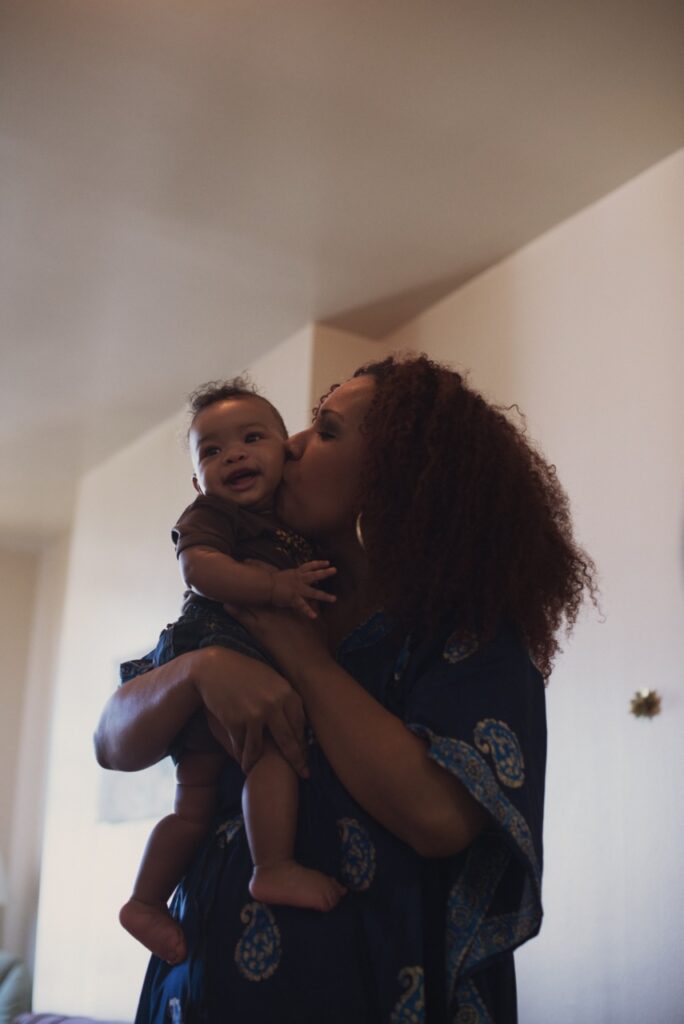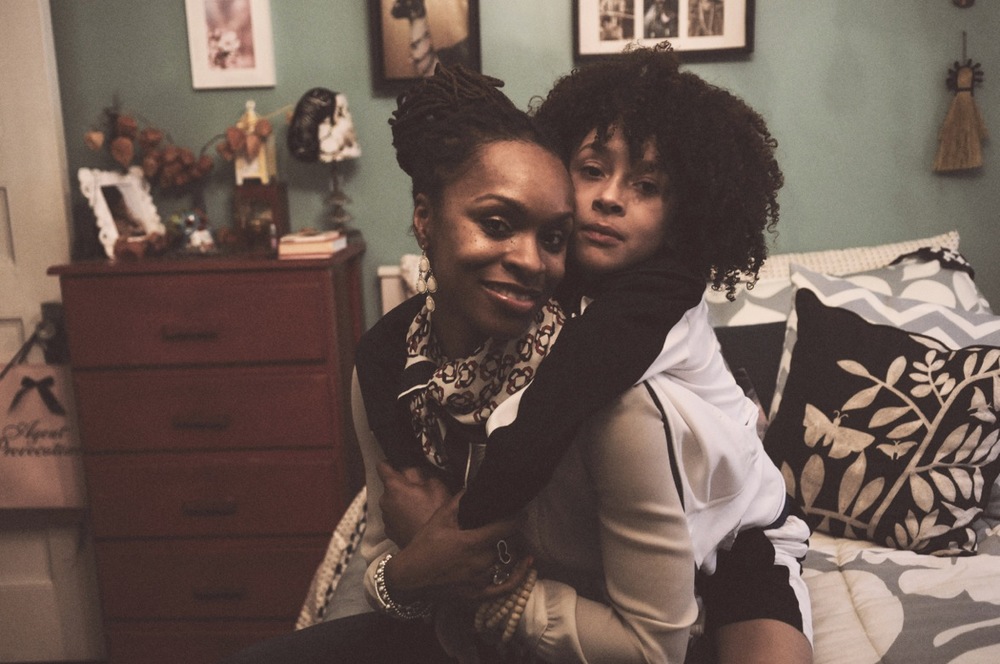As one of the Internet’s fiercest and most-heard voices on today’s cultural issues, Jamilah Lemieux has made fans and detractors alike thanks to her no-holds barred insights on racism, gender, and class. Lemieux shared the details of her tough, but rewarding, pregnancy with mater mea, and explains how she plans on raising her daughter, Naima Freedom, to be just as fierce and empowered as her mother.
Naima Freedom Lemieux-Giles is a baby with a lot of personality. She gurgles, she bounces, she roars with pleasure at every new sight and sound, showing a gummy grin that never fails to put a smile on her mother’s face.
“She is everything,” 29-year-old Jamilah Lemieux says in awe. “She is the sweetest, smartest, friendliest little pumpkin that I’ve ever met. She’s just an incredible child.”

The adoration is present everywhere you look in Jamilah Lemieux’s cozy Brooklyn apartment. Her home is a veritable shrine to her 6-month-old daughter, with photos of Naima at various stages of her infancy tucked and framed on every available wall, table, and shelf.
Actually, the only thing occupying nearly as much visual space in their apartment are snapshots from and back issues of Ebony Magazine. (Lemieux works as Ebony.com’s digital news and lifestyle editor.) Using her biting wit and gimlet eye to discuss race, class, and sexuality, Lemieux has become a trusted Black feminist voice over her lifelong career of telling it like it is.
“I don’t think of myself as an influencer or a thought leader, but just somebody with opinions who can turn a phrase,” she says. “I think that as a writer I articulate some things that some folks connect with. So long as that’s the case, I feel very lucky to have that opportunity to do it professionally.”
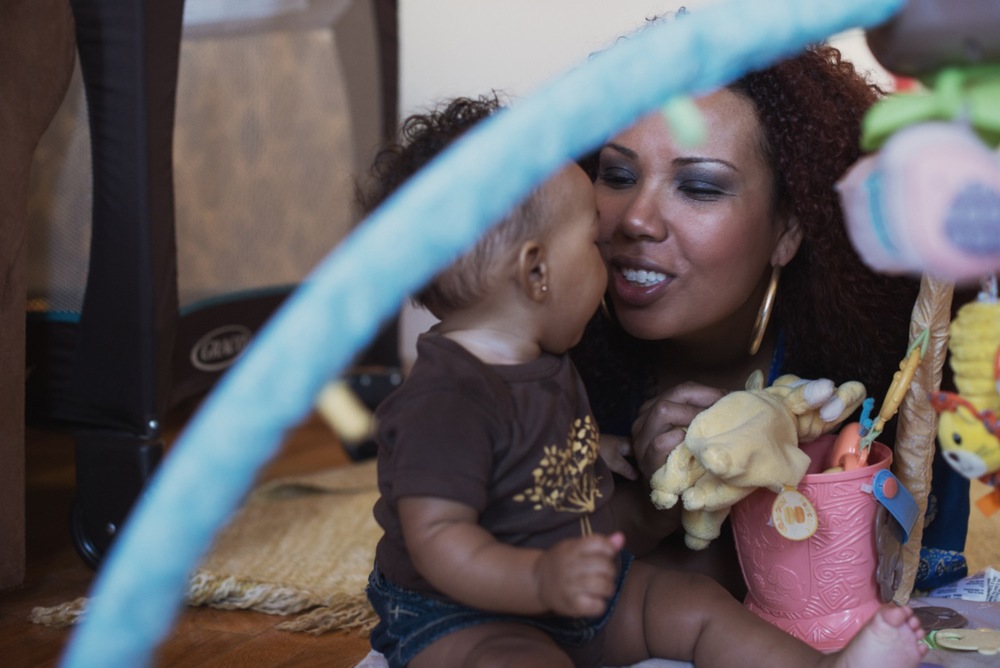
But writing wasn’t her first passion.
Raised in the South Side of Chicago (across the street from the Obama mansion, but by no means Obama rich), Jamilah Lemieux made it known to her parents at age 12 that she wanted to move to New York City to become an actress or singer. Her first stop on that path was Howard University in Washington D.C. in 2002, where she declared herself a theater arts major.
Lemieux loved her school, but felt a little directionless as a fifth-year senior in 2007.
“I only had to take one class and I wasn’t working. I was in D.C. just kind of chilling and being a professional attender of happy hours,” she remembers. “[So] I started a blog quite casually.”
Black Girl Found (and then later, The Beautiful Struggler) became an outlet for Lemieux as she tried to figure out, like so many 20-somethings, what was next.
“I kind of alternated between writing these essays about issues and just kind of telling these stories about my somewhat unusual life,” she says.
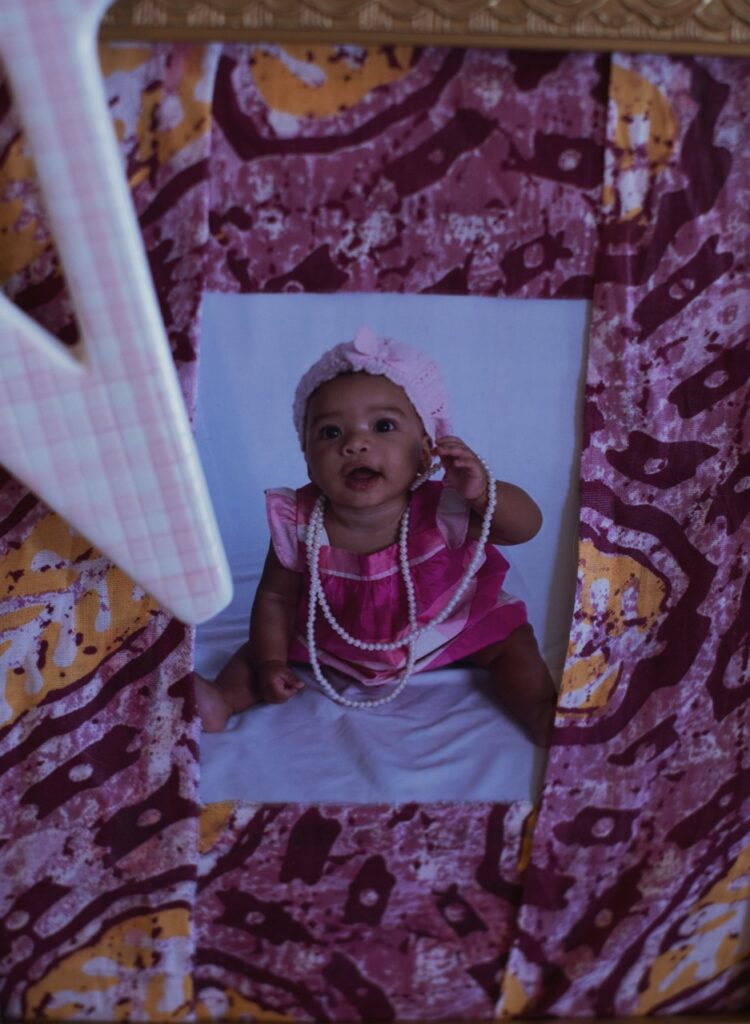
It wasn’t until one of her posts went viral in 2009 that Jamilah Lemieux began to consider her writing as “the thing that mattered.” A satirical, “half-joking, half-not” post she wrote on her site asking white people to stay home for then President-elect Obama’s historic inauguration was picked up by Gawker’s feminist site Jezebel, and the Internet’s response was swift.
“There were all these predictions that there were going to be millions of people in D.C. and the city couldn’t handle it, that there would be craziness and anarchy,” Lemieux remembers. “So I wrote a letter [asking] white people to stay home. I don’t care how many bumper stickers or buttons you hand out or how many calls you made, this doesn’t have the same emotional meaning [for you] that it does for us and I think you should just take one for the team and let us have it.”
Some people didn’t get it. (Responses included “How dare you?” and “I probably did more to get him elected than you.”)
But those who did understand propelled Jamilah Lemieux and her voice to a wider audience. She began contributing to a number of blogs, including Clutch, Essence, and Madame Noire.
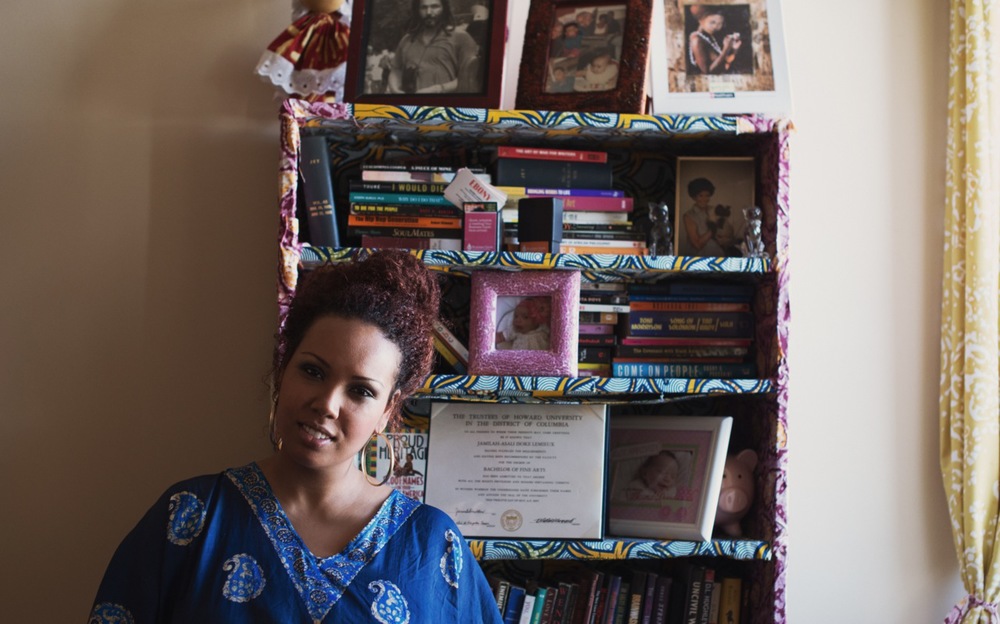
“It was really a moment for me,” Lemieux says. “It was cool to be a part of this generation of black girl writers who had grown up reading Dream Hampton and Joan Morgan and Akiba Solomon, and now being a part of the conversation and being able to pay homage to them by continuing this work.”
Her articles often touched on larger issues such as gender by looking at her own life. In a blog post for Loop21 titled, “I’ll Have A Baby By…,” Lemieux, then just beginning her professional writing career, reflected on her desire to become a mother.
“I’ve got what seems to be the ideal candidate for marriage and fatherhood on my arm and we’ve had ‘the talk,’” she wrote. “I was a bit sad when I realized that I was off my track, but I’d much rather face motherhood at 36 and ready to rock than to try and meet some goal that I’d rationalized in my head without being truly prepared and excited for such a new life.”

“I had an informal list of things I wanted to accomplish before becoming a mother,” Lemieux explains now. “I really wanted to purge myself of all my selfishness, travel the world, and be married. [But] that’s just not how things worked out.”
Last year, Lemieux found out she was pregnant by her boyfriend of two years in the middle of a stormy breakup.
“At the time I was incredibly in love with this person who was no longer in love with me,” she says. “There was a lot of shame because I was going into single motherhood—it wasn’t that I was in a relationship that ended during the pregnancy, or right after the pregnancy, or two years later.”

After much reflection Jamilah Lemieux ultimately decided to have the baby despite her concerns. She co-parents Naima with her ex who has since gotten married. He remains a strong and daily presence in their daughter’s life.
“We’re both committed to raising a strong and healthy girl,” Lemieux says now. “I’m very happy that she has a great relationship with her dad. I may hate the man, but I don’t hate the dad.”

Despite the dramatic circumstances around her conception, Naima’s squeals and obvious love of life—along with the added purpose she has brought her mother—only confirm to Jamilah Lemieux that she made the right decision.
“This child in this moment is supposed to be here,” Lemieux says. “I’m lucky that for the situation that we have, I got the child that I needed.”
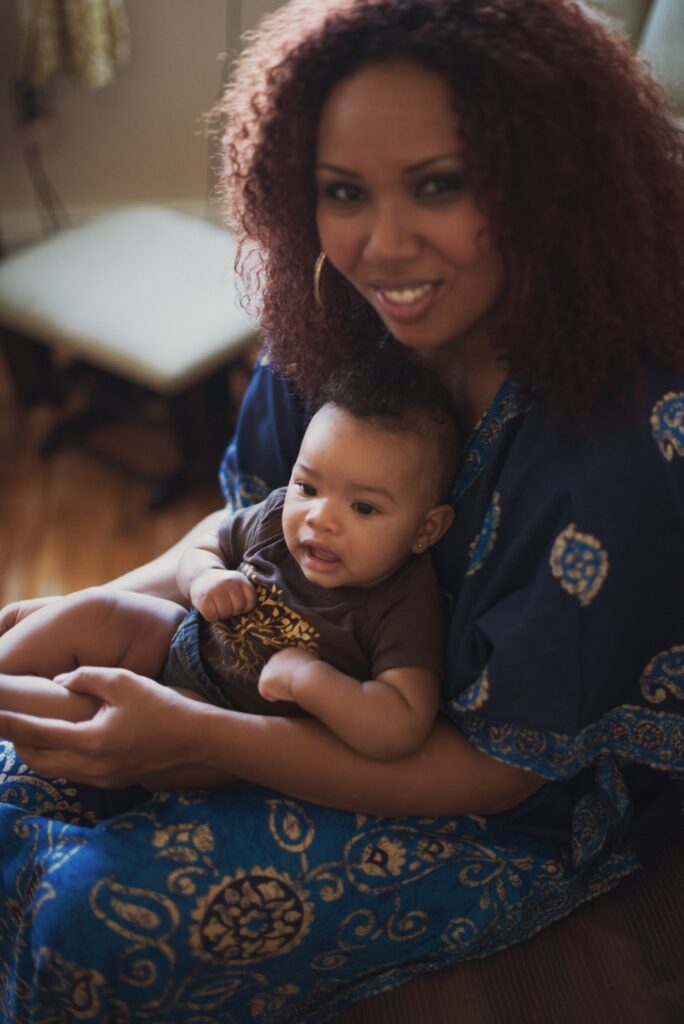
Q&A
JAMILAH LEMIEUX, HOW HAS BECOMING A MOM CHANGED YOUR LIFE?
Being a mother hasn’t changed me as much as I had expected. I’m still very much Jamilah. I’m 29, I still feel very young. I thought that being a mom was going to make me 42 overnight. (Laughs)
A lot of my values and thoughts and feelings are the same. [But now] there’s this little person who is the most important thing in my life.
She’s my constant companion and the reason for me doing everything that I do. It’s enhanced my life. It’s a love that I’ve never experienced before. It’s amazing and new and different every day.
HOW DID YOU FEEL WHEN YOU LEARNED YOU WERE GOING TO BE A MOM?
I was happy when the nurse told me that I was pregnant, even though it took me a while to decide if there was going to a baby or a procedure.
She was conceived during a breakup with my long-term boyfriend. I thought that this was a sign from God, that we were going to get back together and be a happy family. That wasn’t what happened, and I prepared myself for that [when] I decided to keep the baby. But even in that moment, my first thought was happiness.
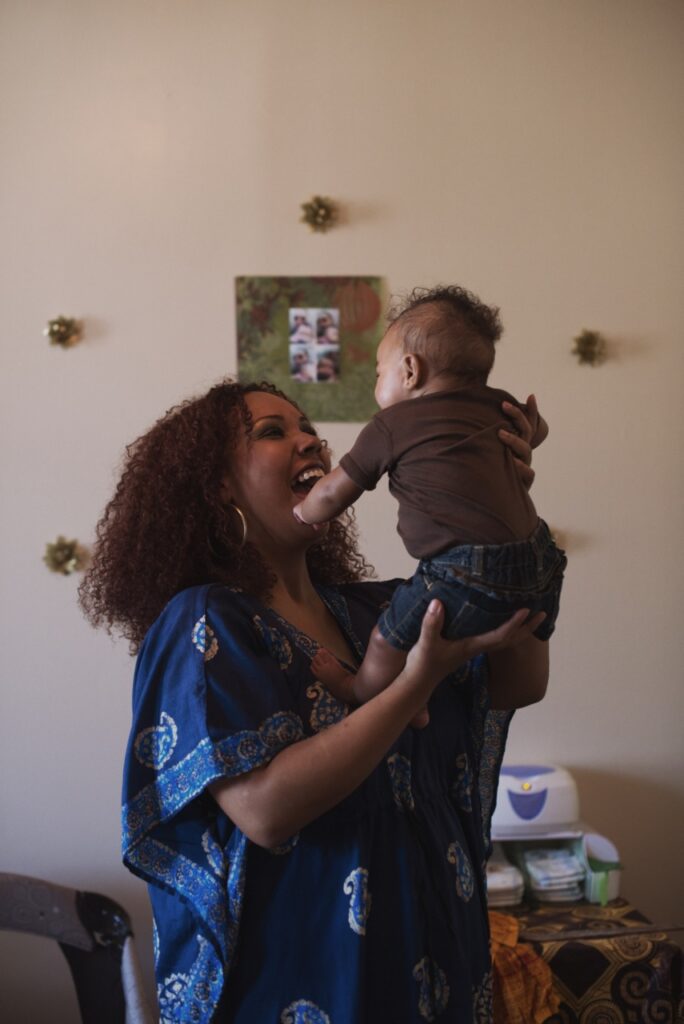
WHAT MADE YOU DECIDE TO KEEP THE BABY?
When I made the decision to go forward with the pregnancy under a difficult set of circumstances… there were a lot of reasons.
For one I’ve been told some years ago that I would have a difficult time getting pregnant [because] I have polycystic ovaries. Even though I have not battled with that the way other women who have PCOS do, it’s something I’ve always kept with me.
I’ve been very sexually responsible throughout all of my relationships, serious and casual, and this was the only time that there has been just a true failure to protect myself. It just sort of felt like a sign. I thought this was supposed to happen.
I don’t think it signaled what I thought it signaled, but I do believe that I was supposed to have her.

WHAT WAS YOUR PREGNANCY LIKE, JAMILAH LEMIEUX?
I had a terrible pregnancy. I was incredibly depressed. I gained a lot weight, [which was hard] as somebody who has been very health conscious. The only thing I could enjoy doing when I was pregnant was eating and I ate everything.
I went from this period of always being anxious about gaining weight to having this “reason” to eat with abandon. There were times where I was just so sad about the relationship not being in place anymore, and the prospect of being a single mother, that I couldn’t really enjoy being pregnant.
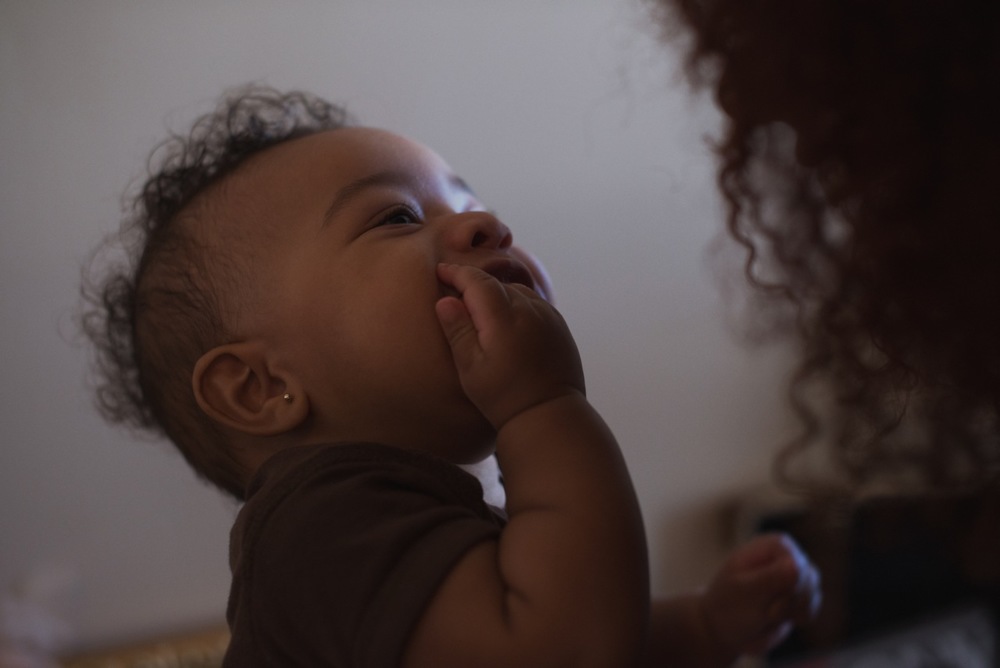
WHAT WERE YOUR THOUGHTS ON SINGLE MOTHERHOOD BEFORE YOU BECAME A MOTHER?
I always thought being a single mother was the absolute last thing in the world that I would ever, ever, ever want to be.
Ultimately I chose to do it, but I’m co-parenting with somebody who got engaged to another woman that he started dating the week we conceived, got engaged to when I was five months pregnant, and married when we had a 2 month old.
I am not OK with the situation. But if I have to sacrifice my personal comfort for the sake of my child and her relationship with her father, then that’s something I will do gladly.

Being a single parent, in a lot of ways, requires a level of self-sacrifice that I did not want to make. I see a lot of women who I feel had to live for their children and sacrifice everything, and it just seemed that there’s nothing left for them.
I have a mother who pretty much gave up her life in a lot of ways—her pursuits and some of the things she wanted to do personally and professionally—to just become a mom. That’s not to say that’s not enough and it can’t be fulfilling, but it’s not what I want for myself. And it’s not the sort of relationship I want to have with my daughter. I think that she’ll be happy that we’ll get to experience a lot of cool things together because I haven’t put the brakes on everything that makes me me just to be a mom. And if I do have other children in the future, the same goes for them.

I [think] that as much as this child deserves to be loved and nurtured and all the things that I’m giving her, I would like someone to give to me.
I still believe that I shall have those things in time. I’m a good-looking woman, I have a beautiful child, I have a career, I’m independent… that ain’t for everybody. There are plenty of guys out there who have no interest in dating a woman with children and that’s fine. But there are those who would.
I do feel that partnership and love will come to me in some form or fashion. It might not be in the way I’d imagined it, but it’s not something that I’m not invested in anymore.

NAIMA IS PRETTY YOUNG, BUT DO YOU HAVE AN IDEA OF WHAT YOUR PARENTING PHILOSOPHY IS?
I really want to raise a free Black girl.
I want her to be self-possessed and confident and strong, but not tied to the notion of being a strong Black woman.
I want her to be strong and for her will [and pride] to be strong at the appropriate times.
I just want her to navigate the world with as little baggage as possible. For her to be loving and kind and tolerant and radical and outspoken and just full of knowledge of self and pride in who she is as a girl and as a Black person.
It’s my mission to equip her with those tools and to make sure that she never feels that she’s less than. I can’t see myself clipping her wings just to fit into some kind of picture of what a parent is supposed to do.

ESPECIALLY WHEN IT COMES TO BEING BLACK OR RAISING A BLACK CHILD, WHERE THE IDEA “YOU HAVE TO BE TWO TIMES BETTER THAN A WHITE PERSON” IS A COMMON REFRAIN.
I think so. You know what? I have never lived my life in comparison to what white folks were doing: what they were eating, what they were listening to, what they wearing, what they were naming their kids.
I gave my child a name that is “ethnic.” Her name is Naima Freedom. I don’t think that anyone is going to hear that and assume that she’s going to come in and look like Cindy Brady.
I’m not going to pretend that racism, sexism, and whatever other-ism she may have to encounter depending on certain parts of her identity as she gets older [don’t exist]. They’re very real things and she will be equipped to do battle.
At the same time I don’t want her to feel that she has something to prove to some other folks. She has something to prove to herself and to herself only. She has her parents and her community to make proud, but she does not have anything to prove to folks who look like her. And certainly not to those who don’t.

YOUR WRITING CAREER HAS BEEN PROLIFIC, AND ALSO AT TIMES FRAUGHT WITH CONTROVERSY. HOW DO YOU DEAL WITH THE OUTRIGHT VITRIOL SOME PEOPLE HAVE HAD TOWARDS YOU AND YOUR WORK?
If I could write about race and gender without getting vitriol then we probably wouldn’t be in a white supremacist, capitalist patriarchy. We would be where we wanted to be and we [would] be talking about this from a place of nostalgia.
I’ve had YouTube videos made about me. I’ve had people write blog posts about me, not just saying “She wrote this thing and I disagree with it” but “What a terrible person she is!” and “She is the downfall of the Black community!” The biggest thing is not taking it personally.
I’d like to think that I deal with it better now than I did when it first started happening. I can be very snarky and sarcastic, but even if somebody had kind of gone there with me, I try to handle it with grace because you really don’t know what people are going through.
You just have to be so dissatisfied with your life to put a lot of energy into actively hating somebody because they have a difference of world view.
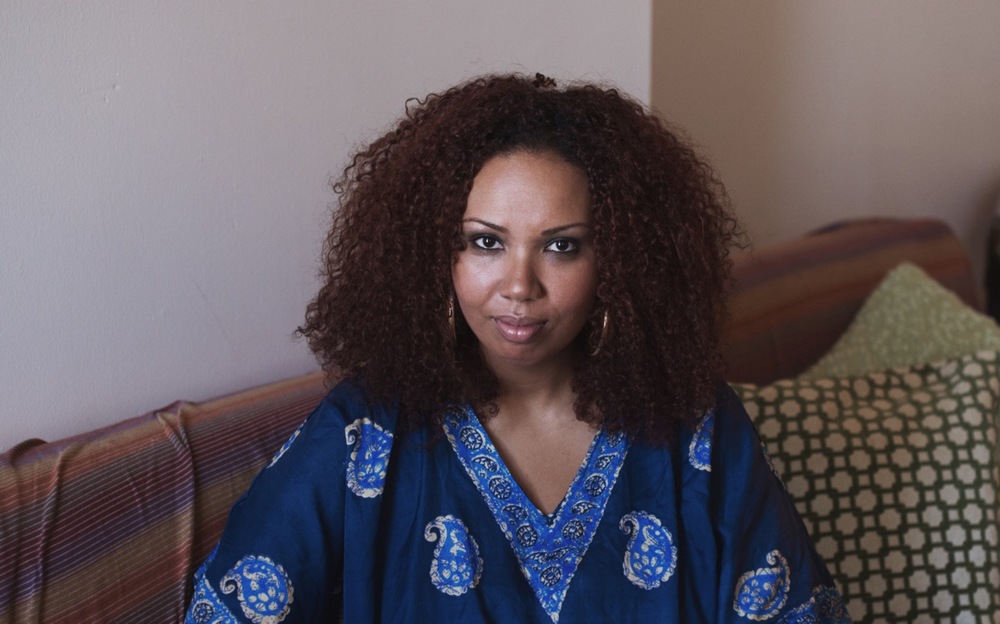
WHAT PERSPECTIVE OR EXAMPLE DO YOU HOPE TO IMPART ON YOUR DAUGHTER THROUGH YOUR WORK?
Everything that I’ve done professionally, and a lot of the things I’ve done in my personal life, comes from a place of just being totally and completely in love with Black people, and that is something that I want her to have.
No matter whom she becomes friends with, no matter whom she gets in a relationship with, I just want her to have such an unbending, unwavering love for Black people and for herself.

People say “Why haven’t you tried to go over to [a mainstream publication]?” Blackness is enough for me. I don’t see it as limiting. [For] a lot of people, the big goal is to work for or live beside somebody else.
I am so proud to work for a Black company. I just want her to know that blackness is a good place to be. I’m from the South Side of Chicago, I went to Howard, I’m an AKA, I work for Johnson Publishing Company, blackness is great.
That’s why I gave my little Black girl a Black-girl name; I don’t make any apologies for that because her purpose in life is not to figure out how to be accepted or loved by other people, but to accept and love herself.

